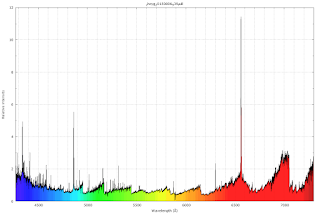The collimation was a small effort but a big gain as the stars are now round in the guiding camera. It did improve efficiency!
The camera is also an improvement as lower noise. It took long time to find the right parameters in ISIS software to reduce the data, but software helped in adjusting the camera angle. Now, in binning 2x2, the overall system is fairly efficient except poor seeing at this location but this, I can't change!
Here is a collection of images of the observatory, control room and inside the dome. And some results from last night...
telescope C11 inside the Pulsar 2.7m dome
the eShel fiber injection unit capture the light of the stars which are "transported" to the eShel spectrograph through a 50µm optical fiber...
the Atik titan (blue) camera is attached to the eShel fiber injection unit so we can see the field of fiew and center the star into the 50µm fiber hole
View of the telescope inside the dome with mountains behind
the spectrographe is now dehind the (red) curtain!
the eShel spectrograph with the calibration unit (seeral calibration lamps) controled by computer
the dome is now open
ambiance during the night, watching a video as the system guide itself (autoguiding)
copy of screen of the computer which controls everything
spectrum of a reference star; the deep absorptions are from left to right: Hgamma, Hbeta & Halpha
a symbiotic star CH Cygni (combined spectrum) with strong emissin lines
SPLAT-VO view of individual orders of the spectrograph (before proper merging)













Aucun commentaire:
Enregistrer un commentaire